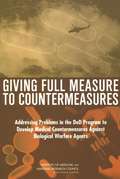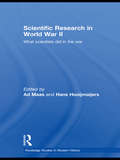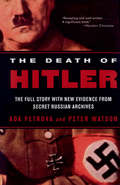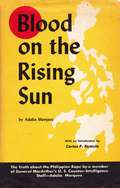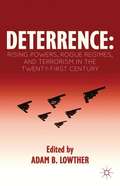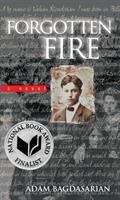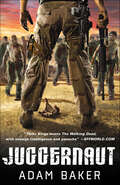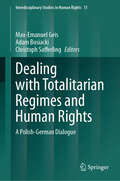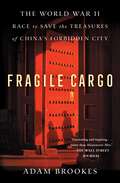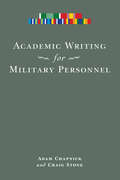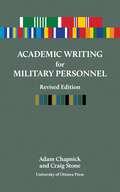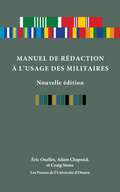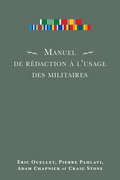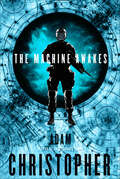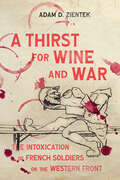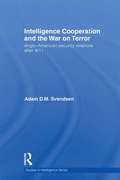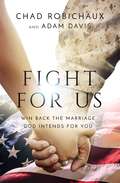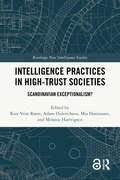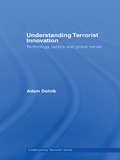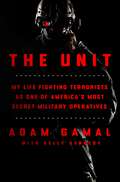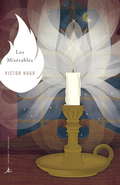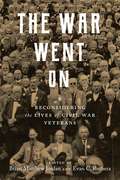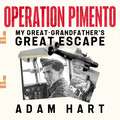- Table View
- List View
Giving Full Measure to Countermeasures: Addressing Problems in the DoD Program to Develop Medical Countermeasures Against Biological Warfare Agents
by Acquisition of Medical Countermeasures Against Biological Warfare AgentsIn recent years, substantial efforts have been initiated to develop new drugs, vaccines, and other medical interventions against biological agents that could be used in bioterrorist attacks against civilian populations. According to a new congressionally mandated report from the Institute of Medicine and National Research Council of the National Academies, to successfully develop these drugs, vaccines, and other medical interventions against biowarfare agents, Congress should authorize the creation of a new agency within the Office of the Secretary of the U.S. Department of Defense. The committee recommended that Congress should improve liability protections for those who develop and manufacture these products, to stimulate willingness to invest in new research and development for biowarfare protection. Giving Full Measure to Countermeasures also identifies other challenges—such as the need for appropriate animal models and laboratories equipped with high-level biosafety protections—that will require attention if DoD efforts to develop new medical countermeasures are to be successful.
Scientific Research In World War II: What scientists did in the war
by Ad Maas Hans HooijmaijersThis book seeks to explore how scientists across a number of countries managed to cope with the challenging circumstances created by World War II. No scientist remained unaffected by the outbreak of WWII. As the book shows, there were basically two opposite ways in which the war encroached on the life of a scientific researcher. In some cases, the outbreak of the war led to engagement in research in support of a war-waging country; in the other extreme, it resulted in their marginalisation. The book, starting with the most marginalised scientist and ending with those fully engaged in the war-effort, covers the whole spectrum of enormously varying scientific fates. Distinctive features of the volume include: a focus on the experiences of ‘ordinary’ scientists, rather than on figureheads like Oppenheimer or Otto Hahn contributions from a range of renowned academics including Mark Walker, an authority in the field of science in World War II a detailed study of the Netherlands during the German Occupation This richly illustrated volume will be of major interest to researchers of the history of science, World War II, and Modern History.
The Death of Hitler: The Full Story with New Evidence from Secret Russian Archives
by Peter Watson Ada Petrova"Revealing and well-written. . . . A significant book."--Houston Chronicle It is one of the most enduring mysteries of the twentieth century: how, exactly, Adolf Hitler died and what happened to his remains. With access to the Russians' Hitler Archive, this book reveals not only what happened after the Russians captured Hitler's bunker but also why the Soviets felt the details of his death had to be suppressed.
Blood on the Rising Sun: A Factual Story of the Japanese Invasion of the Philippines
by Adalia MarquezThe Truth about the Philippine Rape by a member of General MacArthur’s U.S. Counter-Intelligence Staff—Adalia MarquezBLOOD ON THE RISING SUN is a true story of life in Manila under Japanese occupation and, later, during the American liberation. There have been many tales told about guerrilla activities and underground operations in the Philippines but in almost all of them the chief protagonists are Americans. BLOOD ON THE RISING SUN is the story of the fights against the Japanese waged by a Filipino woman, her husband, and their friends and presents an aspect of the Philippine resistance that has never yet been told.Adalia’s account of life in the prison hellhole of Fort Santiago describes the terrible privations and tortures the inmates were forced to undergo. Later on Adalia worked for the American Counter-Intelligence Corps and helped pin authenticated collaboration charges on many Manilans who had sold out to the enemy. While carrying on this task she received numerous threats against her life and the lives of her children.On the Philippines was staged the Bataan Death March, as well as the crucial landings on the Island of Leyte. Many who will read the story of those two unforgettable episodes of the War of the Pacific will feel deeply grateful to Adalia, her husband Tony, and the hundreds of other brave Filipinos who sacrificed all for freedom.BLOOD ON THE RISING SUN is not a book of light fiction. The truth asserts itself and here in this book Adalia Marquez writers with eloquence and simplicity, which go direct to the human heart.
Deterrence
by Adam B. LowtherWith many scholars and analysts questioning the relevance of deterrence as a valid strategic concept, this volume moves beyond Cold War nuclear deterrence to show the many ways in which deterrence is applicable to contemporary security. It examines the possibility of applying deterrence theory and practice to space, to cyberspace, and against non-state actors. It also examines the role of nuclear deterrence in the twenty-first century and reaches surprising conclusions.
Forgotten Fire
by Adam BagdasarianIn 1915 Vahan Kenderian is living a life of privilege as the youngest son of a wealthy Armenian family in Turkey. This world of comfort and security is shattered when some family members are whisked away and others are murdered before his eyes. In too short a time, Vahan loses his home and family and, to survive, is forced to live a life he could never have dreamed of. Somehow Vahan’s incredible strength and spirit help him endure even when he knows that each day could be his last.
Juggernaut
by Adam Baker"A high-voltage shock to the system. It's smart, witty, crammed with action and disturbingly plausible. Highly recommended." –Jonathan Maberry, New York Times bestselling author of Assassin's CodeA brilliant, gripping portrait of survival in the face of complete annihilation. THEY SEARCHED FOR GOLD. THEY FOUND DEATH. Iraq 2005. Seven mercenaries hear an enticing rumor: somewhere, abandoned in the swirling desert sands, lies an abandoned Republican Guard convoy containing millions of pounds of Saddam's gold. They form an unlikely crew of battle-scarred privateers, killers and thieves, veterans of a dozen war zones, each of them anxious to make one last score before their luck runs out. After liberating the sole surviving Guard member from US capture, the team makes their way to the ancient ruins where the convoy was last seen. Although all seems eerily quiet and deserted when they arrive, they soon find themselves caught in a desperate battle for their lives, confronted by greed, betrayal, and an army that won't stay dead. An unputdownable military thriller that SFFworld.com called "Three Kings meets The Walking Dead," Juggernaut is a heart-pounding, fast-paced read that doesn't let up until the last page.
Dealing with Totalitarian Regimes and Human Rights: A Polish-German Dialogue (Interdisciplinary Studies in Human Rights #11)
by Christoph Safferling Max-Emanuel Geis Adam BosiackiThis book delves into the intertwined narratives of Poland and Germany's post-war experiences, shedding light on their shared trauma from World War II and subsequent confrontations with communism. Authored by scholars from Faculty of Law and Administration, University of Warsaw and Law School of Friedrich-Alexander University Erlangen-Nuremberg, it opens a critical dialogue about the nations' efforts to recover from war, dictatorship, and human rights abuses. From constitutional law to criminal justice, the chapters explore diverse facets of their shared history, offering fresh insights and reflections. This collaborative effort culminates in a comprehensive analysis of post-war politics and legal frameworks, providing valuable perspectives on transitional justice and human rights protection. Through meticulous research and interdisciplinary discourse, the book aims to deepen Polish-German friendship, foster academic cooperation, and honor the memory of past generations while envisioning a future rooted in the rule of law, human rights, and peace for both nations and Europe as a whole. Through insightful contributions and meticulous research, it navigates complex legal and political landscapes, providing valuable insights into the challenges and opportunities inherent in navigating the legacies of war, dictatorship, and human rights abuses. It reflects on the profound implications of historical events, such as the Treaty of Versailles and the Nuremberg Trials, on legal and political landscapes. Through detailed examinations of institutional transformations and legal frameworks, it highlights the challenges of confronting past injustices and shaping future trajectories.
Fragile Cargo: The World War II Race to Save the Treasures of China's Forbidden City
by Adam BrookesThe gripping true story of the bold and determined museum curators who saved the priceless treasures of China&’s Forbidden City in the years leading up to World War II and beyond.Spring 1933: The silent courtyards and palaces of Peking&’s Forbidden City, for centuries the home of Chinese emperors, are tense with fear and expectation. Japan&’s aircrafts drone overhead, its troops and tanks are only hours away. All-out war between China and Japan is coming, and the curators of the Forbidden City are faced with an impossible question: how will they protect the vast imperial art collections in their charge? A difficult and monumental decision is made: to safeguard the treasures, they will need to be evacuated. The magnificent collections contain a million pieces of art—objects that carry China&’s deepest and most ancient memories. Among them are irreplaceable artefacts: exquisite paintings on silk, vanishingly rare Ming porcelain, and the extraordinary Stone Drums of Qin, which are adorned with 2,500-year-old inscriptions of crucial cultural significance. For sixteen terrifying years, under the quiet leadership of museum director Ma Heng, the curators would go on to transport the imperial art collections thousands of miles across China—up rivers of white water, across mountain ranges, and through burning cities. In their search for safety the curators and their fragile, invaluable cargo journeyed through the maelstrom of violence, chaos, and starvation that was China&’s Second World War. Told for the first time in English and playing out across a vast historical canvas, this is the exhilarating story of a small group of men and women who, when faced with war&’s onslaught on civilization, chose to resist. Fragile Cargo reminds us of the enduring power of beauty in a world beset by conflict and violence.
Academic Writing for Military Personnel
by Adam Chapnick Craig StoneAcademic Writing for Military Personnel is written for members of the military who are either new to or re-entering the academic community and who need to familiarize themselves with academic writing. The authors, an experienced writing instructor and a retired military officer, show how persuasive academic writing enhances officers’ effectiveness in their regular duties, especially as they reach more senior levels of service. They explain the differences between staff writing and academic writing, and outline some of the common errors military personnel make when transitioning from one to the other. The book’s chapters outline the value of strong written communication skills, the research process, the writing process, academic referencing, and frequent grammatical and syntactical errors. Specific examples chosen with a military audience in mind are integrated throughout the book to provide the reader with relevant and practical guidance. The book concludes with a discussion on how officers can use the knowledge they have acquired through their professional experiences in their academic work. As the only comprehensive guide to effective academic writing designed specifically for military personnel, this book will be a crucial addition to the libraries of junior and senior officers in militaries worldwide.
Academic Writing for Military Personnel, revised edition: Revised Edition (Standalone titles)
by Adam Chapnick Craig StoneAcademic Writing: A Guide for Military Personnel est un manuel de rédaction conçu pour aider le personnel militaire à rédiger des travaux savants dans un style clair et efficace. Fruit de la collaboration entre un professeur d’écriture chevronné et un officier militaire à la retraite, le manuel s’adresse aux membres des forces armées qui rejoignent le monde universitaire et qui ont déjà rédigé dans un contexte professionnel militaire ou qui n’ont aucune expérience de la rédaction. En plus d’enseigner aux officiers comment rédiger efficacement, cet ouvrage explique en quoi la maîtrise des techniques de rédaction est utile au personnel des forces armées dans leurs tâches régulières, en particulier aux échelons supérieurs. L’ouvrage traite de l’importance de savoir communiquer par écrit, de ce qui distingue la rédaction savante de la rédaction professionnelle, des processus de recherche et de rédaction proprement dite, du professionnalisme dans la sphère universitaire ainsi que des problèmes et défis fréquemment rencontrés par les rédactrices et les rédacteurs. Un dernier chapitre novateur traite de la manière dont les officiers peuvent mettre à profit les connaissances qu’ils ont acquises par leurs expériences professionnelles dans le contexte universitaire. Des exemples concrets — à l’usage particulier des militaires — sont présentés tout au long du texte pour guider la lectrice et le lecteur de manière pratique et pertinente.Cette édition révisée comprend de nouveaux exemples provenant d’une plus grande variété d’auteurs. Elle prend en compte l’évolution récente des technologies de communication et reflète les nouvelles avancées dans les domaines de l’enseignement et de l’apprentissage.Cet ouvrage, qui est le seul guide exhaustif sur la rédaction à l’usage du personnel militaire, est un ajout incontournable à la bibliothèque de tout officier militaire où qu’il se trouve et quel que soit son rang.Ce livre est publié en anglais. Note : Une version française de ce livre sera disponible en 2023.Formats disponibles : couverture souple, PDF accessible et ePub accessible
Manuel de rédaction à l'usage des militaires, nouvelle édition
by Adam Chapnick Craig Stone Eric OuelletManuel de rédaction à l'usage des militaires est conçu pour aider le personnel militaire à rédiger des textes scientifiques dans un style clair et efficace. Fruit de la collaboration entre un professeur d’écriture chevronné et un officier militaire à la retraite, le manuel s’adresse aux membres des forces armées qui rejoignent le monde universitaire et qui ont déjà rédigé dans un contexte professionnel militaire ou qui n’ont aucune expérience de la rédaction. En plus d’enseigner aux officiers et officières comment rédiger efficacement, ce manuel explique en quoi la maîtrise des techniques de rédaction est utile au personnel des forces armées dans leurs tâches régulières, en particulier aux échelons supérieurs. L’ouvrage traite de l’importance de savoir communiquer par écrit, de ce qui distingue la rédaction savante de la rédaction professionnelle, des processus de recherche et de rédaction proprement dite, du professionnalisme dans la sphère universitaire ainsi que des problèmes et défis fréquemment rencontrés par les rédactrices et les rédacteurs. Un dernier chapitre novateur traite de la manière dont les officiers peuvent mettre à profit les connaissances qu’ils ont acquises par leurs expériences professionnelles dans le contexte universitaire. Des exemples concrets — à l’usage particulier des militaires — sont présentés tout au long du texte pour guider la lectrice et le lecteur de manière pratique et pertinente.Cette édition révisée comprend de nouveaux exemples provenant d’une plus grande variété de sources. Elle prend en compte l’évolution récente des technologies de communication et reflète les nouvelles avancées dans les domaines de l’enseignement et de l’apprentissage.Cet ouvrage, le seul guide exhaustif de rédaction à l’usage du personnel militaire, est un ajout incontournable à la bibliothèque de tout officier et officière militaire, où qu’il se trouve et quel que soit son rang.Ce livre est publié en français. Formats disponibles : couverture souple, PDF accessible et ePub accessible
Manuel de rédaction à l’usage des militaires
by Adam Chapnick Craig Stone Éric Ouellet Pierre PahlaviLe Manuel de rédaction à l’usage des militaires est un guide de rédaction qui s’adresse aux membres des forces armées appelés à rédiger des textes de qualité dans un style soutenu pour un lectorat militaire averti. Au-delà de l’art de rédiger de manière précise et convaincante, ce manuel fait valoir auprès des militaires gradés qu’une bonne compréhension des rudiments de la rédaction contribue à leur propre efficacité dans leur fonction, tout particulièrement lorsqu’ils accèdent aux rangs supérieurs de l’institution. Le Manuel de rédaction à l’usage des militaires a été développé de manière à habiliter les militaires gradés à aller au-delà de la simple rédaction d’une note de service pour réussir une rédaction plus élaborée qui intègre les règles « universelles » des travaux universitaires. Il aborde divers aspects de la rédaction : l’importance de parfaire ses connaissances et ses habiletés en rédaction; le processus de rédaction et les différences selon le style adopté et les lectorats visés; la méthodologie et la recherche; les questions éthiques comme le plagiat; et les difficultés et les pièges les plus courants. Le dernier chapitre s’avère novateur dans la mesure où il porte sur la façon dont les membres des forces armées peuvent s’inspirer de leur expérience militaire comme élément porteur d’un exercice de rédaction. Des exemples précis, toujours avec un lectorat militaire à l’esprit, complètent le texte. Le Manuel de rédaction à l’usage des militaires est unique en son genre puisqu’il a été conçu spécifiquement à l’intention du personnel des forces armées. Les auteurs Éric Ouellet et Pierre Pahlavi et les collaborateurs Adam Chapnik et Craig Stone sont des professeurs chevronnés qui enseignent au Collège des Forces canadiennes de Toronto. Ce livre, taillé sur mesure pour répondre à un besoin précis, est donc appelé à devenir une référence incontournable dans ce milieu, à l’instar de sa version originale en langue anglaise, Academic Writing for Military Personnel, d’Adam Chapnik et Craig Stone. - Ce livre est publié en français
The Machine Awakes (Spider War #2)
by Adam ChristopherAdam Christopher's The Machine Awakes is a far future space opera set in the Spider War universe of Burning Dark. In the decades since the human race first made contact with the Spiders—a machine race capable of tearing planets apart—the two groups have fought over interstellar territory. But the war has not been going well for humankind, and with the failure of the Fleet Admiral's secret plan in the Shadow system, the commander is overthrown by a group of hardliners determined to get the war back on track.When the deposed Fleet Admiral is assassinated, Special Agent Von Kodiak suspects the new guard is eliminating the old. But when the Admiral's replacement is likewise murdered, all bets are off as Kodiak discovers the prime suspect is one of the Fleet's own, a psi-marine and decorated hero—a hero killed in action, months ago, at the same time his twin sister vanished from the Fleet Academy, where she was training to join her brother on the front.As Kodiak investigates, he uncovers a conspiracy that stretches from the slums of Salt City to the floating gas mines of Jupiter. There, deep in the roiling clouds of the planet, the Jovian Mining Corporation is hiding something, a secret that will tear the Fleet apart and that the Morning Star, a group of militarized pilgrims searching for their lost god, is determined to uncover.But there is something else hiding in Jovian system. Something insidious and intelligent, machine-like and hungry.The Spiders are near.At the Publisher's request, this title is being sold without Digital Rights Management Software (DRM) applied.
A Thirst for Wine and War: The Intoxication of French Soldiers on the Western Front (Intoxicating Histories)
by Adam D. ZientekBeginning in the fall of 1914, every French soldier on the Western Front received a daily ration of wine from the army. At first it was a modest quarter litre, but by 1917 it had increased to the equivalent of a full bottle each day. The wine ration was intended to sustain morale in the trenches, making the men more willing to endure suffering and boredom. The army also supplied soldiers with doses of distilled alcohol just before attacks to increase their ferocity and fearlessness. This strategic distribution of alcohol was a defining feature of French soldiers’ experiences of the war and amounted to an experimental policy of intoxicating soldiers for military ends.A Thirst for Wine and War explores the French army’s emotional and behavioural conditioning of soldiers through the distribution of a mind-altering drug that was later hailed as one of the army’s “fathers of victory.” The daily wine ration arose from an unexpected set of factors including the demoralization of trench warfare, the wine industry’s fear of losing its main consumers, and medical consensus about the benefits of wine drinking. The army’s related practice of distributing distilled alcohol to embolden soldiers was a double-edged sword, as the men might become unruly. The army implemented regulations and surveillance networks to curb men’s drinking behind the lines, in an attempt to ensure they only drank when it was useful to the war effort. When morale collapsed in spring 1917, the army lost control of this precarious system as drunken soldiers mutinied in the thousands. Discipline was restored only when the army regained command of soldiers’ alcohol consumption.Drawing on a range of archives, personal narratives, and trench journals, A Thirst for Wine and War shows how the French army’s intoxication of its soldiers constituted a unique exercise of biopower deployed on a mass scale.
Intelligence Cooperation and the War on Terror: Anglo-American Security Relations after 9/11 (Studies in Intelligence)
by Adam D.M. SvendsenThis book provides an in-depth analysis of UK-US intelligence cooperation in the post-9/11 world. Seeking to connect an analysis of intelligence liaison with the wider realm of Anglo-American Relations, the book draws on a wide range of interviews and consultations with key actors in both countries. The book is centred around two critical and empirical case studies, focusing on the interactions on the key issues of counterterrorism and weapons of mass destruction (WMD) counter-proliferation. These case studies provide substantive insights into a range of interactions such as 9/11, the 7/7 London bombings, the A.Q. Khan nuclear network, the prelude to the 2003 Iraq War, extraordinary rendition and special forces deployments. Drawing on over 60 interviews conducted in the UK and US with prominent decision-makers and practitioners, these issues are examined in the contemporary historical context, with the main focus being on the years 2000-05. This book will be of much interest to students of intelligence studies, foreign policy, security studies and International Relations in general. Adam Svendsen has a Phd in International History from the University of Warwick. He has been a Visiting Scholar at the Center for Peace and Security Studies, Georgetown University, and has contributed to the International Security Programme at Chatham House and to the work of IISS, London.
Fight for Us: Win Back the Marriage God Intends for You
by Adam Davis Chad RobichauxFight for Ustakes couples on an inspiring journey into the challenges of battling for their marriage, through gut-wrenching times of despair, and then finally to the victory of a renewed relationship grounded in Jesus.Fight for Us delivers a compelling marriage challenge of "five rounds" that teach readers how to develop the never-give-up, never-quit mentality every relationship needs in order to combat the enemy's constant attacks.Utilizing narrative elements from the real-life story of Chad and Kathy Robichaux, readers will learn how Chad's deployments to Afghanistan as a Marine--and subsequent career as an MMA fighter--allowed him to disengage from his emotions, his marriage, and his children. Then, when his crippling PTSD brought him to brink of suicide, Kathy's pastor taught him the "five rounds" of fighting that are necessary in the battle for any marriage:Believe that God loves you and has a purpose for your life.Take responsibility for your actions.Accept that you can't change the evils that you've encountered.Access God's power.Put yourself second.At the end of the rounds, readers will discover God's design for marriage, which saved Chad and Kathy's relationship. Today, they aim to pay it forward and share what they've learned with other couples. Fight for Us features application sections, discussion prompts, affirmations, and Bible verses, all designed to help readers apply the book's key marriage principles.
Intelligence Practices in High-Trust Societies: Scandinavian Exceptionalism? (Routledge New Intelligence Studies)
by Kira Vrist Rønn Adam Diderichsen Mia Hartmann Melanie HartvigsenThis book examines the dynamics of intelligence practices in the Scandinavian culture of high social cohesion and high trust.Situated within the new body of scholarly literature, the book emphasizes critical empirical investigations of intelligence practices, highlighting the specific cultural settings of such practices. By providing Scandinavian perspectives on intelligence studies, the work distinguishes Scandinavian intelligence studies from the predominant Anglo-American perspectives. Throughout the Western world, the past two decades have generated a rapid expansion of the legal mandate, funding, and capabilities of intelligence agencies which, simultaneously, have been pushed to renegotiate and renew their legitimacy and democratic mandate in response to a recurrent pattern of scandals, leaks, and failures. While these tendencies are also evident in Scandinavia, the book argues that it is important to emphasize the unique context of cohesion and trust in state agencies that differentiates Scandinavian welfare states from the American (and to a lesser extent British) contexts. This book brings together scholars from Norway, Sweden, and Denmark to address the continuous renegotiation of the legitimacy of state intelligence as it plays out in a Scandinavian setting.This book will be of interest to students of intelligence studies, Nordic politics, security studies, and International Relations.
Understanding Terrorist Innovation: Technology, Tactics and Global Trends (Contemporary Terrorism Studies)
by Adam DolnikThis book explores the innovations and advances in terrorist tactics and technologies to help fill the gap in the contemporary terrorism literature by developing an empirical theory of terrorist innovation. The key question concerns the global historical trends in terrorist innovation, as well as the critical factors responsible for the differences in practices among terrorist organizations. The first part of the book provides an overview of the tactics and technology used by terrorists in the last century and identifies the key trends for the future. The second part compares four differing terrorist organizations with the aim of identifying key factors in producing innovative tactics and weaponry. The volume provides a historical explanation of the trends in terrorist innovation and also has policy relevance, as the ability to identify signature characteristics of innovation-prone terrorist organizations is a critical element in predictive threat assessment. Understanding Terrorist Innovation will be of great interest to students of terrorism studies, security studies and political science in general.
The Unit: My Life Fighting Terrorists as One of America's Most Secret Military Operatives
by Kelly Kennedy Adam GamalThe first and only book to ever be written by a member of America's most secret military unit―an explosive and unlikely story of service and sacrifice.Inside our military is a team of operators whose work is so secretive that the name of the unit itself is classified. Highly-trained in warfare, self-defense, infiltration, and deep surveillance, "the Unit," as the Department of Defense has asked us to refer to it, has been responsible for preventing dozens of terrorist attacks in the Western world. Never before has a member of this unit shared their story — until now.From Adam Gamal, one of the only Muslim Arab Americans to serve inside “the Unit," comes an incisive firsthand account of our nation’s most secretive military group. When Adam arrived in the United States at the age of twenty, he spoke no English, and at 5’1” and 112 pounds, he was far from what you might expect of a soldier. But compelled into service by a debt he felt he owed to his new country, he rose through the ranks of the military to become one of its most elite and skilled operators.With humor and humility, Adam shares stories of life-threatening injuries, of the camaraderie and capabilities of his team, and of the incredible missions―but also of the growth he experienced as he learned to understand his own moderate faith.Enthralling and eye-opening, The Unit is at once a gripping account of the fight against terror, an urgent examination of the need for diversity, and an inside look at how America fights its battles abroad in the modern age of terrorism.This edition includes a 16 page color photo insert.
The Evolution of U.S. Military Policy from the Constitution to the Present, Volume I: The Old Regime: The Army, Militia, and Volunteers from Colonial Times to the Spanish-American War (G - Reference,information And Interdisciplinary Subjects Ser.)
by Michael Shurkin Gian Gentile Jameson Karns Adam GivensTracing the evolution of the U.S. Army throughout American history, the authors of this four-volume series show that there is no such thing as a “traditional” U.S. military policy. Rather, the laws that authorize, empower, and govern the U.S. armed forces emerged from long-standing debates and a series of legislative compromises between 1903 and 1940. Volume I traces U.S. military policy from the colonial era through the Spanish-American War.
The Evolution of U.S. Military Policy from the Constitution to the Present, Volume IV: The Total Force Policy Era, 1970–2015 (G - Reference,information And Interdisciplinary Subjects Ser.)
by Miranda Priebe Gian Gentile Jameson Karns Adam Givens Alexandra Evans M Wade MarkelTracing the evolution of the U.S. Army throughout American history, the authors of this four-volume series show that there is no such thing as a “traditional” U.S. military policy. Rather, the laws that authorize, empower, and govern the U.S. armed forces emerged from long-standing debates and a series of legislative compromises between 1903 and 1940. Volume IV traces how Total Force Policy has been implemented since 1970.
Les Misérables
by Victor Hugo Adam Gopnik Julie RoseSensational, dramatic, packed with rich excitement and filled with the sweep and violence of human passions, LES MISERABLES is not only superb adventure but a powerful social document. The story of how the convict Jean-Valjean struggled to escape his past and reaffirm his humanity, in a world brutalized by poverty and ignorance, became the gospel of the poor and the oppressed.
The War Went On: Reconsidering the Lives of Civil War Veterans
by Matthew Norman Jonathan A. Noyalas Steven E. Sodergren Rebecca Howard Zachery Fry Jonathan Neu Sarah Handley-Cousins Angela M. Riotto Kurt Hackemer Tyler Sperrazza Matthew Christopher Hulbert Kelly Mezurek Adam H. DombyIn recent years, Civil War veterans have emerged from historical obscurity. Inspired by recent interest in memory studies and energized by the ongoing neorevisionist turn, a vibrant new literature has given the lie to the once-obligatory lament that the postbellum lives of Civil War soldiers were irretrievable. Despite this flood of historical scholarship, fundamental questions about the essential character of Civil War veteranhood remain unanswered. Moreover, because work on veterans has often proceeded from a preoccupation with cultural memory, the Civil War’s ex-soldiers have typically been analyzed as either symbols or producers of texts. In The War Went On: Reconsidering the Lives of Civil War Veterans, fifteen of the field’s top scholars provide a more nuanced and intimate look at the lives and experiences of these former soldiers.Essays in this collection approach Civil War veterans from oblique angles, including theater, political, and disability history, as well as borderlands and memory studies. Contributors examine the lives of Union and Confederate veterans, African American veterans, former prisoners of war, amputees, and ex-guerrilla fighters. They also consider postwar political elections, veterans’ business dealings, and even literary contests between onetime enemies and among former comrades.
Operation Pimento: My Great-Grandfather's Great Escape
by Adam HartA moving, thrilling account of one man's extraordinary escape from the Nazis - as told by his great-grandson. Perfect for fans of Ben Macintyre and Damien Lewis 'Frank Griffiths' incredible escape and evasion story will become a wartime classic. Truly inspiring.' - ANDY McNAB'An affectionate and often audacious tale of an unsung WW2 hero. Adam Hart is a writer to watch out for.' - ANTHONY HOROWITZ'A thrilling tale of courage, bravery and survival, brought to life by Hart's gripping narrative and fascinating personal connection. A superb debut.' - ALICE LOXTON'This moving family history pays fitting tribute to the courage and resilience of the Special Duties Squadrons' crews, and the heroism of the French resisters serving alongside them.' - CLARE MULLEY'A classic tale of Second World War derring-do, told with flair. A wonderful debut.' - ROBERT PENN On 14 August 1943, Adam Hart's great-grandfather Frank Griffiths took off from RAF Tempsford, the SOE 'Special Duties' airbase in rural England. Frank and his crew were on a secret midnight mission codenamed Operation Pimento, but they were shot down near Annecy in southeast France.Only Frank survived.Though seriously injured, Frank felt it was his duty to get back to England to continue the fight against the Nazis. He embarked on a perilous, 1,200-mile, 108-day escape across Europe, via the attic of a brothel, a Frenchwoman's chimney and a Spanish prison cell. Seventy-nine years later, Frank's 22-year-old great-grandson Adam Hart retraced the epic escape through France, Switzerland and Spain. His emotional encounters with descendants of people who'd risked their lives to help his great-grandfather reveal the enduring legacy of Operation Pimento and how we should never forget their sacrifice.Operation Pimento is not only a riveting true story, but also a vivid account of one young man's journey to discover more about a man he'd never met, but always knew to be a hero.
